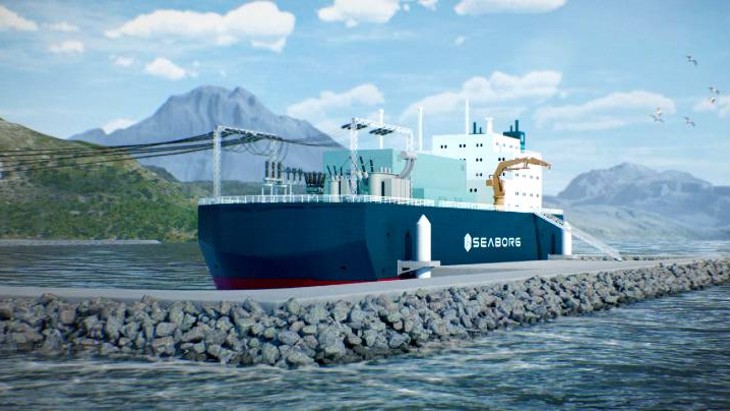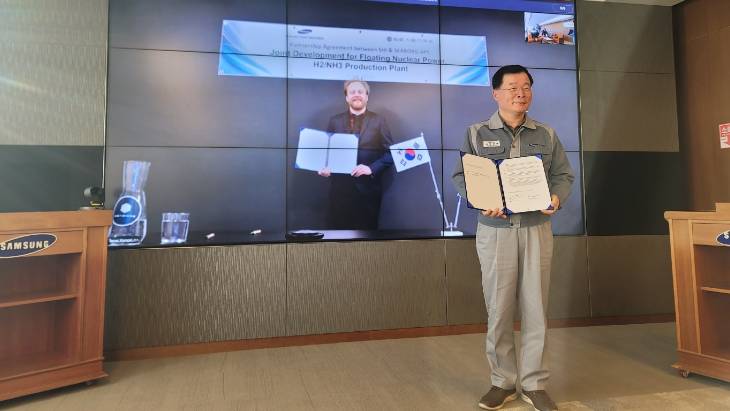The Memorandum of Understanding is to manufacture and sell turnkey power plants combining Samsung Heavy Industry’s ship-building expertise and the Danish company’s Compact Molten Salt Reactor (CMSR). It also covers development of hydrogen production plants and ammonia plants.

How a 200 MWe Power Barge could look (Image: Seaborg)
08 April 2022
Seaborg’s design is for modular CMSR power barges that can produce between 200 MW and 800 MW of electricity, with an operational life of 24 years. Instead of having solid fuel rods that need constant cooling, the CMSR’s fuel is mixed in a liquid salt that acts as a coolant, which means that it will simply shut down and solidify in case of emergency.
Jin-Taek Jeong, president and CEO of Samsung Heavy Industries, said: "CMSR is a carbon-free energy source that can efficiently respond to climate change issues and is a next-generation technology that meets the vision of Samsung Heavy Industries.
"Through this agreement, we plan to pioneer the CMSR-based floating nuclear power plant market as part of strengthening its future new business opportunity."
The partnership agreement was signed at an online event, with Seaborg CEO and co-founder Troels Schönfeldt saying: "We are honoured and proud to have formed this partnership with Samsung Heavy Industries, one of the world’s largest and most experienced shipyards. It is another step forward in our quest to introduce a new generation of nuclear reactors that are clean and safe and can be built using industrial technology with all the benefits of scalability, speed, and lower costs."

08 April 2022
Seaborg’s design is for modular CMSR power barges that can produce between 200 MW and 800 MW of electricity, with an operational life of 24 years. Instead of having solid fuel rods that need constant cooling, the CMSR’s fuel is mixed in a liquid salt that acts as a coolant, which means that it will simply shut down and solidify in case of emergency.
Jin-Taek Jeong, president and CEO of Samsung Heavy Industries, said: "CMSR is a carbon-free energy source that can efficiently respond to climate change issues and is a next-generation technology that meets the vision of Samsung Heavy Industries.
"Through this agreement, we plan to pioneer the CMSR-based floating nuclear power plant market as part of strengthening its future new business opportunity."
The partnership agreement was signed at an online event, with Seaborg CEO and co-founder Troels Schönfeldt saying: "We are honoured and proud to have formed this partnership with Samsung Heavy Industries, one of the world’s largest and most experienced shipyards. It is another step forward in our quest to introduce a new generation of nuclear reactors that are clean and safe and can be built using industrial technology with all the benefits of scalability, speed, and lower costs."

The signing of the partnership agreement took place on 7 April (Image: Samsung Heavy Industries)
The timeline for Seaborg, which was founded in 2014, has been for commercial prototypes to be built in 2024 with commercial production of Power Barges beginning from 2026.
Samsung Heavy Industries signed an agreement in June last year with the Korea Atomic Energy Research Institute for offshore molten-salt-cooled reactors development and research.
Researched and written by World Nuclear News
The timeline for Seaborg, which was founded in 2014, has been for commercial prototypes to be built in 2024 with commercial production of Power Barges beginning from 2026.
Samsung Heavy Industries signed an agreement in June last year with the Korea Atomic Energy Research Institute for offshore molten-salt-cooled reactors development and research.
Researched and written by World Nuclear News
No comments:
Post a Comment